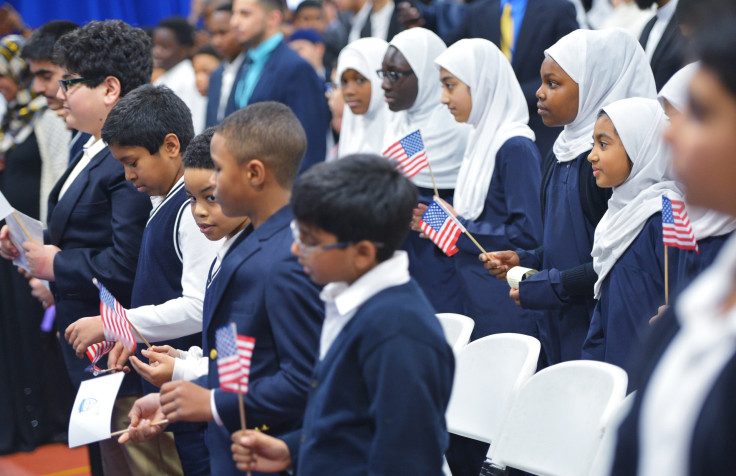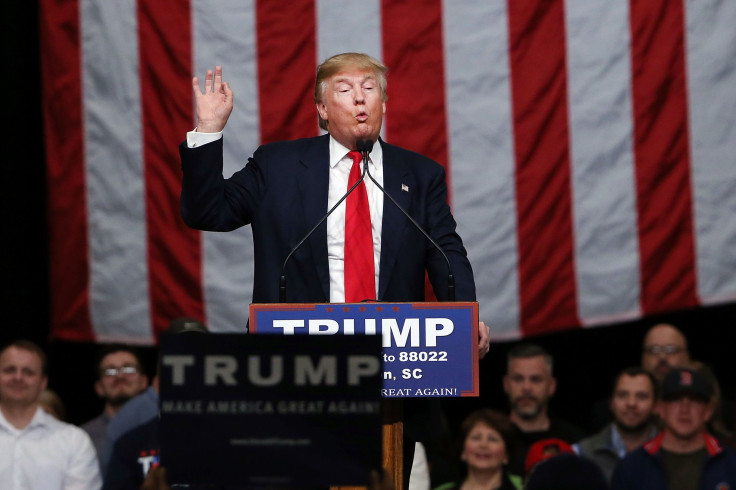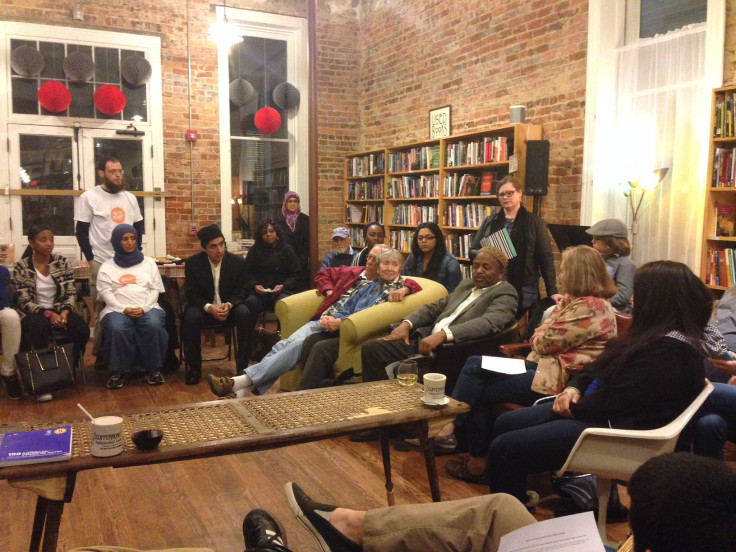American Muslims Respond With Defiance To Donald Trump’s GOP Winning Streak

Sarah Syed, a post-doctoral therapist from the suburbs of Chicago, spent Valentine’s Day weekend visiting her sister in Grand Rapids, Michigan. Donald Trump had just won the New Hampshire primary, and his success was starting to worry her. Like many Americans, she had initially considered Trump’s bid for the presidency — and even the Republican nomination — a sideshow that had no real chance at becoming a reality.
But his decisive victory in New Hampshire raised a red flag, and as a Muslim American, Syed was growing concerned about what was to come. Donald Trump, a man who has been actively calling for a ban on Muslims entering the country, was now one step closer to the highest office in the land. Suddenly that long shot didn't seem so long, and Syed was afraid.
Some of her fears were substantiated when, during a trip to the grocery store in the mostly conservative but fairly cosmopolitan city, she was accosted for her hijab, the headscarf some Muslim women wear. A woman approached Syed, got close in her face, and demanded angrily that she should “take off [her] hat.” Syed was startled.
“I’ve never encountered anything like that with my hijab before,” she said. “I’ve had clients ask me if I’m OK during this election season, and I’ve always said, ‘Yeah, that’s just craziness you hear on TV.’ I know that bigotry exists, but it always felt like people were just saying it online, behind a screen.”
But now, Syed said, the bigots are getting bolder as Trump’s rhetoric has grown louder. “I don’t think it’s a coincidence that these incidents are getting more common as Trump is getting more popular, and it makes me fear what more is ahead,” she added. “No one has ever won South Carolina and New Hampshire and not gotten the nomination. That’s alarming.”
Syed isn't alone in her alarm. American Muslims are starting to ask themselves how they will cope in “Trump’s America,” a topic they can not afford to avoid given that demonizing Muslims has seemingly been a staple of his campaign strategy. Most recently, he advocated killing Muslim terrorists with bullets dipped in pig’s blood and continues to insinuate that President Obama is secretly a Muslim. While the real estate mogul’s nomination is certainly not inevitable, his victories in New Hampshire, South Carolina and Nevada have raised hackles about the real possibility of a President Trump. What’s more, for many American Muslims, his ultimate success doesn’t even matter, they say. The damage has already been done.
“Whether or not he wins, Trump has been given this platform, and he’s using it to incite hatred and violence against Muslims and people of color,” said Saqib Bhatti, a financial policy researcher from Chicago. “Trump is just saying what people want to hear, by feeding off the racism in this country. That’s the real tragedy. He’s unleashing the bigotry — making it OK to voice the types of things that people only say behind closed doors because they weren’t acceptable in public.”

Experts say the apparent increased acceptability of such rhetoric has real consequences. Imran Siddiqi, executive director of the Arizona branch of the Council on American-Islamic Relations, started tracking violence against American Muslims after the San Bernardino attacks in December at hatehurts.net. He says that there have been 30 incidents of violence since San Bernardino.
“All this coincides with the presidential debate season, with candidates like Trump and [Texas Sen. Ted] Cruz fanning the flames against Muslims,” said Siddiqi. “It’s no shock that these crimes are taking place.”
But many American Muslims are not just sitting on the sidelines as victims, but rather adopting a defiant attitude against the prospect of an America that continues to vilify them. Several American Muslims told International Business Times that they had no plans to stay silent or cower in fear, explaining that this country belongs to them as much as it does to anyone else. Others say it has only inspired them to work harder at building bridges with their fellow Americans.
The Muslim Public Affairs Council, a public service agency that works to promote the civil rights of American Muslims, has called on Trump to engage with the Muslim community itself.
“We have news for you: We will no longer be bullied. We will no longer be your punching bag,” the organization said in a public statement sent to the Trump campaign. “We challenge you to a debate with a representative from the American Muslim community on the issues you have raised about Islam and Muslims.”
Rabiah Ahmed, the media director for MPAC, says that the idea of such a debate has sparked excitement among American Muslims. She says that visitors to the MPAC Facebook page have been discussing who would be the best representative to take on Trump.
“It’s easy to demonize a community when there isn’t anyone there to push back and counter his arguments. So far, everything he’s said has been a one-way conversation,” said Ahmed. “Trump is just a man, but he represents a growing sentiment in Americans who are supporting him, and that’s more disturbing to us. We have a role to play in countering that sentiment.”

Others are finding ways to demystify Islam and Muslims in their own communities, as an antidote to hateful rhetoric. Deonna Kelli Sayed, a writer from Greensboro, North Carolina, partnered with Scuppernong Books, an independent bookstore, to launch an “Ask a Muslim Anything” event series. Members of the community are invited to interact with local Muslims in an informal setting and ask frank questions. They have held two so far, with a third to come in March. The response has been overwhelmingly positive; more than 75 people attended the most recent event in February.
“The bookstore owners were concerned about the rhetoric coming from the Trump campaign, and they wanted to do something to counter it,” said Sayed, who proposed holding an informal town meeting. “We realized that many people have never actually met a Muslim, so what better way to challenge the narrative and smash the monolithic view of Islam? Humanization is the perfect counterpoint to the demonization.”
Sarah Syed, the woman who was told to remove her hijab by a complete stranger, says the climate of hostility has spurred many Muslim Americans in her suburban Chicago community to participate in a civic process they had long seen as not serving their interests. Syed has always been an active voter, but many of her friends and family members have been too apathetic to vote in the past. But this election season has inspired a new level of civic engagement. She’s seen local mosques encourage members to vote — something that never happened when she was growing up — and community members discussing the issues both on social media and at social events.
“My husband, who was never registered to vote before this year, finally did. People in the community are starting to take it seriously,” said Syed. “We don’t have a choice.”
© Copyright IBTimes 2024. All rights reserved.





















